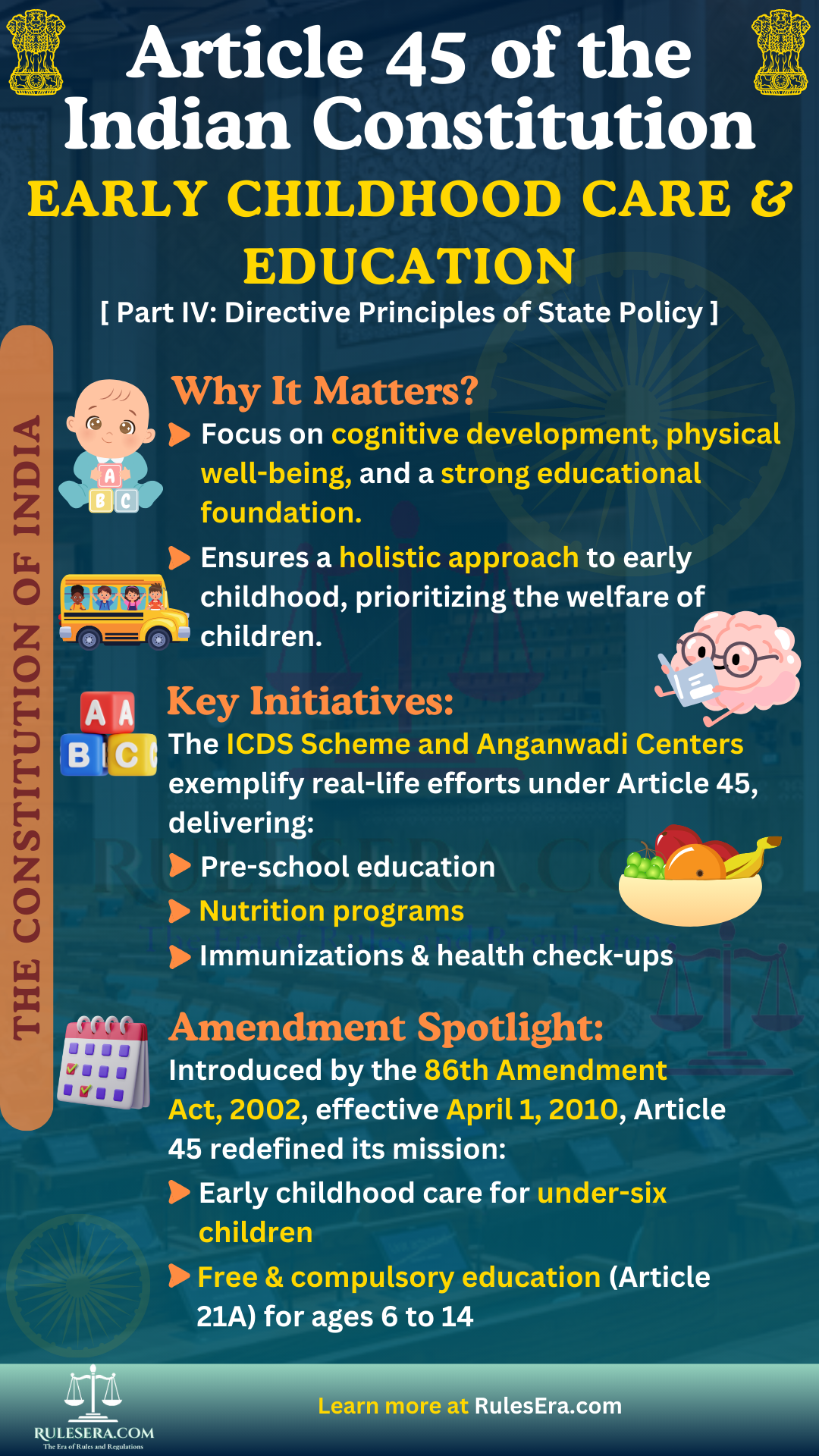Part IV: Directive Principles of State Policy
Article 45: Provision for early childhood care and education to children below the age of six years

--- Original Article ---
The State shall endeavour to provide early childhood care and education for all children until they complete the age of six years.
Explanation
Article 45 of the Constitution emphasizes the State's responsibility to provide early childhood care and education for children below the age of six. This is a crucial part of the Directive Principles of State Policy, ensuring the well-being and developmental needs of young children are prioritized.
Provision for Early Childhood Care and Education
The revised Article 45 highlights the need for the State to focus on the early stages of a child's life by providing access to care and education that supports cognitive and physical development. This is especially important for laying a strong foundation for future learning and well-being.
State's Endeavour to Fulfill This Obligation
While Article 45 is not enforceable in courts, the use of the term "endeavour" ensures that the State continuously strives to allocate resources and implement policies to fulfill this obligation, guiding the government’s actions toward achieving universal early childhood care and education.
Amendments
Article 45 was revised by the Constitution (Eighty-sixth Amendment) Act, 2002, which shifted the responsibility for free and compulsory education for children aged 6 to 14 to Article 21A. The amended Article 45 now focuses exclusively on the care and education of children below the age of six, effective from April 1, 2010.
Real-Life Examples
- Integrated Child Development Services (ICDS): The ICDS program provides essential services such as nutrition, immunization, and early childhood education through Anganwadi centers, directly reflecting the intent of Article 45 by supporting young children’s development, particularly in rural areas.
Historical Significance
The original focus of Article 45 was on free and compulsory education until the age of 14. However, with the 86th Amendment, the understanding of early childhood development evolved, recognizing the importance of care and education in the first six years of life as a critical period for cognitive and social growth.
Legislative History
Article 45 was initially introduced as Article 36 of the Draft Constitution and discussed on November 23, 1948, before being adopted in the final text of the Constitution.
Debates and Deliberations
The Constituent Assembly discussions centered on the importance of primary education and child welfare. Dr. B.R. Ambedkar clarified that the intention was to ensure children were educated until the age of 14, which led to the structure of Article 45 as it was originally framed.
Mr. Naziruddin Ahmad proposed further amendments, emphasizing the need to specify "primary education" to avoid expanding the state's responsibility beyond practical limits.
However, Dr. B.R. Ambedkar clarified that the objective of Article 36 was to ensure children remained in educational institutions until the age of 14, consistent with Article 18, which prohibits child labor below that age. After further discussion, Maitra's amendment was accepted, while Ahmad's amendment was rejected. As amended, Article 36 was adopted as part of the Constitution.
Frequently Asked Questions (FAQs):
Article 45 emphasizes the State's responsibility to provide early childhood care and education for children below the age of six, promoting their overall well-being and development.
The 86th Amendment shifted the responsibility for free and compulsory education for children aged 6 to 14 to Article 21A, while Article 45 was revised to focus on early childhood care and education for children below six years.